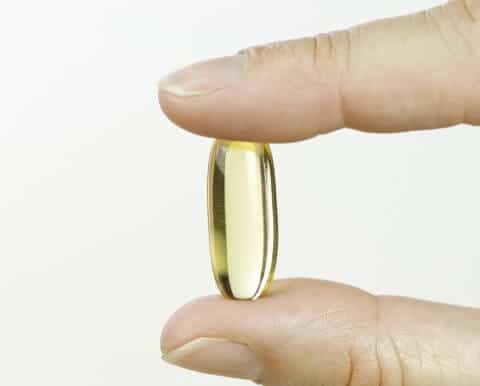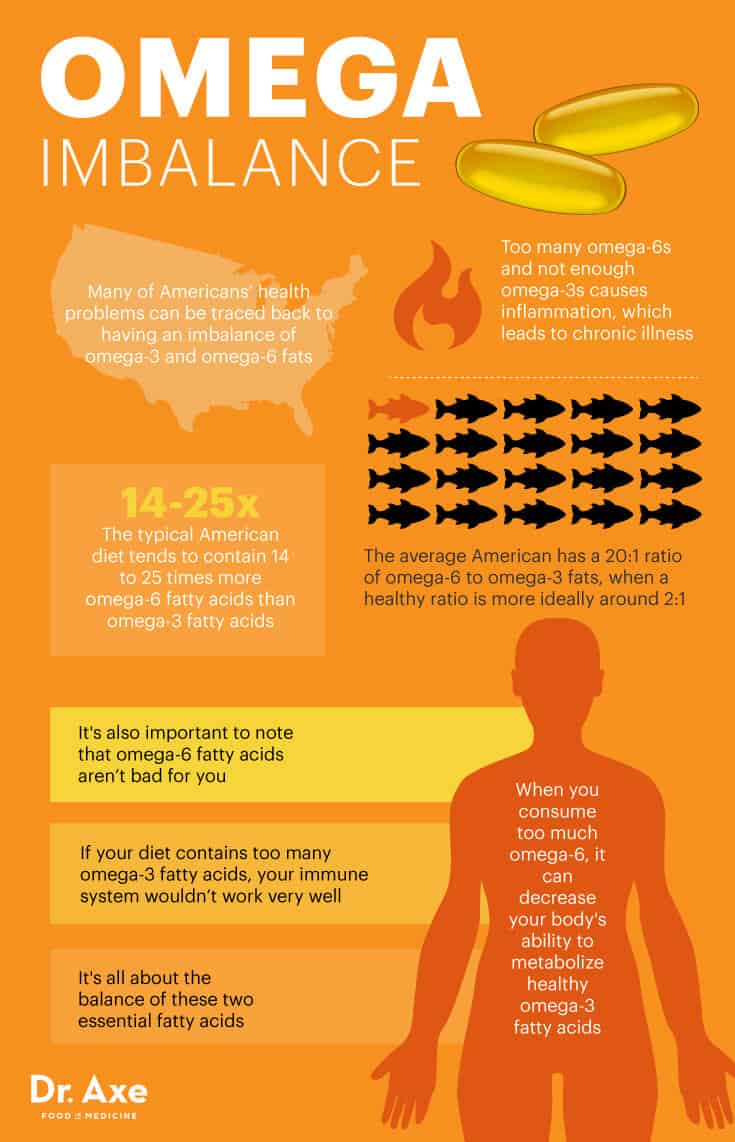13 Fish Oil Benefits Proven Beyond Medicine

According to research conducted at Harvard University, omega-3 fatty acid deficiency is officially one of the top 10 causes of death in America, claiming the lives of up to 96,000 people each year. Out of the 12 dietary, lifestyle and metabolic risk factors examined in the study, omega-3 fatty acid deficiency ranked as the sixth highest killer of Americans. (1) These deaths are considered preventable since getting enough omega 3-fatty acids in your diet can ward off this now common cause of death, and fish oil benefits omega-3 intake as a potent omega-3 source.
The fish oil benefits include decreasing the risk of heart disease and stroke while also helping reduce symptoms of depression, hypertension, attention deficit hyperactivity disorder (ADHD), joint pain, arthritis and chronic skin ailments like eczema. (2) Fish oil intake has also been associated with aiding the body in weight loss, fertility, pregnancy and increased energy. Prescription fish oil has even been approved by the FDA to lower unhealthy high triglyceride levels. (3)
Most of the fish oil benefits are because it’s one of nature’s richest sources of omega-3 fatty acids. While fish oil benefits are numerous, there are some false claims on how to use this incredible supplement, but in this article I go over the proven scientific evidence to demonstrate the true benefits of fish oil.
What Is Fish Oil?
Fish oil comes from the tissues of oily fish. The best sources are cold-water, fatty fish. When it comes to human consumption of fish oil, you can get it from fish themselves or from a fish oil supplement.
Fish oil is a concentrated source of omega-3 fats, which are also called ω-3 fatty acids or n-3 fatty acids. To get more scientific, omega-3s are polyunsaturated fatty acids, or PUFAs. Our bodies are able to make most of the fats we need need, but that’s not true for omega-3 fatty acids. When it comes to these essential fats, we need to get them from omega-3 foods or supplements.
Fish oil contains two very important omega-3 PUFAs. I’m talking about docosahexaenoic acid (DHA) and eicosapentaenoic acid (EPA). DHA and EPA are sometimes called the marine omega-3s because they mainly come from fish. Some of the best fish to eat to obtain fish oil from in your diet include wild-caught salmon, herring, white fish, sardines and anchovies.
Top 13 Fish Oil Benefits
There are so many fish oil benefits. These are just some of the top scientifically proven fish oil benefits I want to make you aware of.
1. ADHD
Many members of the medical community, like myself, believe that suboptimal levels of omega-3 fatty acids may contribute to symptoms of ADHD and related developmental problems as well as many other mental health problems over one’s lifetime. (4)
A 2012 study involved children from 6 to 12 years of age with ADHD who were being treated with methylphenidate and standard behavior therapy for more than six months. The parents of these children reported no improvement in behavior and academic learning using these standard treatments. The researchers randomly gave some of the children an omega-3 and omega-6 supplement or a placebo. They found “statistically significant improvement” for the omega group in the following categories: restlessness, aggressiveness, completing work and academic performance. (5)
Another study found that increasing omega-3 intake, specifically DHA, may improve literacy and behavior in children with ADHD. (6) Fish oil is believed to work via its effects on brain function, which makes sense when you consider that 60 percent of the brain is composed of fats. (7)
2. Alzheimer’s Disease
For several years now, the fish oil and Alzheimer’s disease connection has been studied with consistent results. The essential fatty acids vital for brain function that are found in fish oil can not only slow cognitive decline, but can help prevent brain atrophy in older adults. A study published in the FASEB Journal looked at the health effects of four- to 17-month supplementation with omega-3 fatty acids and antioxidants. The findings once again confirm the potential for fish oil to be used as a weapon to fend off the onset of cognitive decline and Alzheimer’s disease. (8)
Another study conducted by researchers at Rhode Island Hospital examined the relationship between fish oil supplementation and indicators of cognitive decline. The subjects of the study were older adults: 229 cognitively normal individuals, 397 patients with mild cognitive impairment and 193 patients with Alzheimer’s disease. They were assessed with neuropsychological tests and brain magnetic resonance imaging every six months while taking fish oil supplements. The study found that the adults taking fish oil (who had not yet developed Alzheimer’s and did not have genetic risk factor for developing Alzheimer’s known as APOE ε4) experienced significantly less cognitive decline and brain shrinkage than adults not taking fish oil. (9)
3. Anxiety
The European Journal of Neuroscience published a study in 2013 showing that fish oilreversed all anxiety-like and depression-like behavior changes induced in rats. This is an interesting study because it stresses the importance of supplementing with fish oil at “critical periods of brain development.” (10) This is exactly why I recommend giving fish oil to our kids from early on to help them so they won’t develop anxiety or depression later in life.
4. Arthritis
An 18-month study was published in 2014 that evaluated how borage seed oil — rich in GLA — and fish oil rich fared against each other in treating patients with rheumatoid arthritis. It was discovered that all three groups (one taking fish oil, one taking borage oil and one taking a combination of the two) “exhibited significant reductions” in disease activity, and no therapy outperformed the others. For all three, “meaningful clinical responses” were the same after nine months. (11)
This is great news for both fish and borage oil when it comes to arthritis patients, but it’s critical to emphasize that the results were the same because taking too many supplements is simply a waste of money.
Another study also showed that omega-3 fish oil supplements worked just as well asNSAIDs in reducing arthritic pain and are a safer alternative to NSAIDs. (12)
5. Cancer
Scientific studies have found that fish oil can help to prevent and kill various cancers, including colon, prostate and breast. (13) Not only has research proven that it makes conventional cancer drugs more effective, but it’s also an effective stand-alone therapy innatural cancer treatment.
A scientific review published in 2013 looked at omega-3 polyunsaturated fatty acids and prostate cancer prevention. Researchers concluded that there’s a great deal of evidence suggesting that omega-3s have antiproliferative effects – which means they inhibit cancer cell growth – in cancer cell lines, animal models and humans. In addition, the “direct effects on cancer cells” and indirect anti-inflammatory effects on the immune system fighting the cancer likely contribute to the ability of omega-3 fatty acids to inhibit tumor growth. (14)
A group out of India conducted a study published in Cancer Chemotherapy and Pharmacology based on the premise that “fish oil rich in n-3 polyunsaturated fatty acids has been preferred to chemosensitize tumor cells to anti-cancer drugs.” The study found that using 5-Fluorouracil (5-FU) to treat colorectal cancer along with fish oil increased the survival rate in carcinogen-treated animals. Researchers also found that the fish oil ameliorated hematologic depression, along with gastrointestinal, hepatic and renal toxicity caused by the 5-FU. (15)
A scientific review in 2014 evaluated study findings on omega-3 intake in relation to the prevention and treatment of breast cancer, the most prevalent cancer among women. The review found that EPA and DHA, as well as ALA, can differentially inhibit breast tumor development. According to this review, there is solid evidence to support the use of omega-3s as “a nutritional intervention in the treatment of breast cancer to enhance conventional therapeutics, or potentially lowering effective doses.” (16) Additionally, a 2016 study found that “very high fish consumption in early adulthood to midlife may be associated with decreased risk of breast cancer.” (17)
Fish oil also looks to be helpful for another type of cancer experienced by women: endometrial cancer. A scientific study recently published in the American Journal of Clinical Nutrition finds that “long chain omega-3 intake associated with reduced endometrial cancer risk only in normal-weight women.” (18)
6. Cardiovascular Disease
According to the Cardiovascular Research Institute in Maastricht in Netherlands, “Epidemiological studies show that replacing fat with carbohydrates may even be worse [than the Western-type high-fat diet] and that various polyunsaturated fatty acids (FA) have beneficial rather than detrimental effects on CVD (cardiovascular disease) outcome.” This includes fish-oil fatty acids with anti-inflammatory properties, which can help prevent and reverse a plethora of cardiovascular diseases. (19)
Studies have also found that omega-3 fatty acids from fish oil are associated with improved survival rates for heart attack victims. A study published in the medical journalCirculation found that people who took a high dose of fish oil each for six months following the occurrence of a heart attack actually improved their hearts’ overall functioning and also reduced biomarkers of systemic inflammation. (20)

7. Depression
We’ve already seen that fish oil can help with depression-like symptoms in rats, but what about people? A study published in the journal Nutritional Neuroscience evaluated the effects of fish oil supplementation on prefrontal metabolite concentrations in adolescents with major depressive disorder. Researchers found that there was a 40 percent decrease in major depression disorder symptoms in addition to marked improvements in amino acid and nutrition content in the brain, specifically, the right dorsolateral prefrontal cortex. (21)
8. Diabetes
A study published in Brain Research shows how far-reaching fish oil can be for people with diabetes. Researches found that fish oil can help reduce the risk of diabetics from developing cognitive deficit because it protects the hippocampus cells from being destroyed. The study also showed that fish oil could help reduce oxidative stress, which plays a central role in the development of diabetes complications, both microvascular and cardiovascular. (22)
Another recent study shows that fatty fish consumption can cut the risk of eye-diabetes complications. The researches tracked the seafood consumption of about 3,600 diabetic men and women between the ages of 55 and 80 for nearly five years. The researchers found that people who regularly consumed 500 milligrams each day of omega-3 fatty acid in their diets (equal to two servings of fatty fish per week) were 48 percent less likely to develop diabetic retinopathy than those who consumed less. (23)
Combined, this shows consuming fish oil benefits diabetics and that fish oil sources should be included as part of a diabetic diet plan.
9. Eye Disorders
There’s more good news when it comes to fish oil and eye health, and it’s just not just for diabetic this time. Fish oil has been shown to reverse age-related eye disorders. In March 2014, French researchers evaluated 290 patients with age-relatedmacular degeneration (AMD), and they discovered that dietary oil fish and seafood intake were significantly lower in AMD patients. Due to the high EPA and DHA levels in fish oil, it was concluded that this kind of nutritional intervention could especially benefit those at high risk for neovascular age-related macular degeneration. (24)
A higher intake of polyunsaturated fats like those found in fish and fish oils have also been linked to reduced levels of cortical cataracts.
10. Immune System Function
An animal study revealed that when the antioxidant astaxanthin is combined with fish oil, the immune-boosting power is multiplied. The researchers believe that the results of this study are definitely applicable to human health. They conclude that the study reinforces the health-promoting effects of habitual fish consumption. (25)
Salmon is a fish that naturally contains both fish oil and astaxanthin. I also recommending buying a fish oil supplement that contains astaxanthin.
11. Skin and Hair
The health benefits of fish oil can be incredible for the body’s largest organ, the skin. This source of essential fats improves the health and beauty of human skin in several ways. Fish oil benefits and nourishes the skin with fats and contributes fat-soluble vitamins that help skin maintain a smooth, elastic texture. There is also evidence that fish oil prevents wrinkles and works against the aging process.
The deficiency of EPA and DHA in diet contributes to skin conditions, such as dandruff,thinning hair, eczema and psoriasis, as well as age spots and sun spots. Without the essential fatty acids, too much moisture leaves the skin. The truth is your internal health can appear on your skin, and taking fish oil internally as a supplement may be as good as or better than applying conventional moisturizers.
In one study, individuals taking fish oil equivalent to 1.8 grams of EPA had a significant reduction in symptoms of eczema after 12 weeks. Researchers believe that these effects may be due to fish oil’s ability to reduce leukotriene B4, an inflammatory substance that plays a role in eczema. (26)
According to the National Psoriasis Foundation, fish oil can aid in preventing or slowing heart disease, which is especially great for psoriasis and psoriatic arthritis sufferers who are at a higher risk of developing heart disease. (27) When it comes to using fish oil supplements for the alleviation of psoriasis symptoms, studies have been mixed with some showing improvement but others showing no effect. If you suffer from psoriasis, you may want to try a fish oil supplement, or else I highly recommend that you make sure to have fish rich in omega-3s regularly.
One of the biggest reasons fish oil leads to healthier skin is definitely the fact that it can reduce inflammation. Research has shown that fish oil supplements can even reduce sun-induced inflammation and provide sunburn relief. “The sunburn response is markedly reduced by dietary fish oil rich in omega-3 polyunsaturated fatty acids.” (28)
12. Fertility and Pregnancy
Recent studies have shown that the consumption of fish oil (or, more specifically, the omega-3 fatty acids found in fish oil) can improve fertility in both men and women. DHA, which is a byproduct of omega-3 fatty acids, plays a key role in the mobility of sperm and health of sperm in men. Low blood levels of DHA have been linked to decreased fertility. Animal studies have found that the DHA in fish is vital to changing dysfunctional round-headed sperm into strong swimmers with cone-shaped heads packed with egg-opening proteins. (29)
Fish oil has also been shown to increase fertility in women by reducing inflammation,balancing hormones and regulating their cycles. Also, fish oil has been found effective in treating conditions like polycystic ovarian syndrome and endometriosis, which can cause infertility.
Fish oil is also extremely beneficial for pregnant women and their children. Throughoutpregnancy and also while breastfeeding, a woman’s omega-3 needs are even higher than usual. According to the American Pregnancy Association, most U.S. women are deficient in EPA and especially DHA going into pregnancy and get even more depleted during pregnancy, as the placenta supplies the fetus with DHA from the mother’s tissue. Omega-3 DHA is a critical building block of the fetal brain, eyes and nervous system. Once the baby is born, omega-3s continue to be vital to healthy brain development and immune function. (30)
Omega-3 fatty acids also seem to reduce the chance of premature delivery. (31) EPA and DHA intake can help support healthy labor and delivery outcomes. This omega-3 duo also helps normalize mood and overall well-being in the mother after giving birth.
13. Weight Loss
Australian researchers published results of a study examining the effects of fish oil onweight loss in combination with diet and exercise in the May 2007 issue of American Journal of Clinical Nutrition. The results show that a combination of fish oil supplements and regular exercise can reduce body fat while also improving heart and metabolic health. The fish supplementation group had lowered triglycerides, increased HDL cholesterol and improved blood flow. Overall, adding fish oil to a current exercise program (and a overall healthy lifestyle) looks like it can decrease body fat as well as cardiovascular disease risk. (32)
Another small study had all volunteers consume the same exact control diet and substituted fish oil for visible fats (things like butter and cream). The volunteers consumed six grams of fish oil each day for three weeks. They found that body fat mass decreased with the intake of fish oil. The researchers conclude that dietary fish oil reduces body fat and stimulates the use of fatty acids for the production of energy in healthy adults. (33)
If you’ve been wondering, “What does fish oil do?” hopefully you now have a better idea of the very large array of possible fish oil benefits!
Fish Oil Nutritional Background
The main nutritional value of fish oil is its high fatty acid content. As I just mentioned, fish oil benefits come from the fact that it’s rich in the omega-3 fatty acids known as DHA and EPA.
Wondering about the specifics of fish oil nutrition? One teaspoon (four grams) of fish oil from sardines, for example, contains approximately: (34)
- 40.6 calories
- 4.5 grams fat (1.5 grams saturated fat)
- 0 milligrams sodium
- 0 grams fiber
- 0 grams sugar
- 0 grams protein
- 14.9 international units vitamin D (4 percent DV)
- 1,084 milligrams omega-3 fatty acids (DV varies by age and gender)
- 90.6 milligrams omega-6 fatty acids (DV varies by age and gender)
Nutritional information varies by product and fish source. Check supplement labeling for specific details.
Omega-3 Deficiency Side Effects
Many of Americans’ health problems can be traced back to having an imbalance of omega-3 and omega-6 fats. Omega-6 fats aren’t necessarily bad for you, but if they’re consumed in large amounts without omega-3s they cause inflammation, which leads to chronic illness.
Today, the average American has a 20:1 ratio of omega-6 to omega-3 fats, when a healthy ratio is more ideally around 2:1. Put in other numerical terms, the typical American diet tends to contain 14 to 25 times more omega-6 fatty acids than omega-3 fatty acids. (35) This shows just how deficient most of us are and why supplementing with fish oil is so beneficial.
The biggest cause of omega-3 deficiency is the overconsumption of foods high in omega-6 fatty acids. Omega-6 comes from things like fried foods, fast foods and boxed foods that contain vegetables oils like soybean oil, canola oil, sunflower oil, cottonseed oil and corn oil. When you consume too much omega-6, it can decrease your body’s ability to metabolize healthy omega-3 fatty acids. (36)
Research has shown that having a lower ratio of omega-6/omega-3 fatty acids can reduce the risk of many common chronic diseases. Getting enough omega-3, which means having a proper balance of omega-3 and omega-6, has been shown in hundreds of studies to possibly provide benefits to many inflammatory diseases, including: (37)
- ADHD
- Asthma
- Arthritis
 Autoimmune diseases
Autoimmune diseases- Cancer
- Depression
- Heart disease
It’s also important to know that even though certain other foods like flaxseeds and grass-fed beef contain omega-3 fats, those omegas are ALA and not EPA/DHA like what’s found in fish oil. According to the medical research, there are far more health benefits in fish oil (EPA/DHA) than flax oil (ALA) for most people.
It’s also important to note that omega-6 fatty acids aren’t bad for you. In fact, if your diet contains too many omega-3 fatty acids, your immune system wouldn’t work very well. It’s all about the balance of these two essential fatty acids.
How to Take Fish Oil Supplements
Your best way to achieve a good balance of omega-3 and omega-6 is by getting your fish oil from wild-caught fish like salmon. However, I still think it is beneficial for some to supplement with a high quality omega 3 fish oil or cold liver oil. Plus, cold water fish are frequently contaminated with mercury and pesticide residues, making it very difficult to safely achieve recommended levels.
Therefore, supplementing your diet with pure anti-oxidant rich fish oil can be one of the best ways to get your omega 3s. The types of fish which are most commonly used in fish oil supplements are salmon, cod liver, mackerel, sardines, halibut, pollock and herring.
 Currently, there isn’t a set standard recommendation for how many omega-3s we need each day, but suggestions range from a fish oil dosage of 500 to 1,000 milligrams daily depending on whom you ask. How easy is it to get these recommended amounts? To give you an idea, there are more than 500 milligrams of total omega-3s in one can of tuna fish and one small serving of wild-caught salmon.
Currently, there isn’t a set standard recommendation for how many omega-3s we need each day, but suggestions range from a fish oil dosage of 500 to 1,000 milligrams daily depending on whom you ask. How easy is it to get these recommended amounts? To give you an idea, there are more than 500 milligrams of total omega-3s in one can of tuna fish and one small serving of wild-caught salmon.
When taking fish oil, more is not always better. Remember that you want it to stay in a balanced ratio with omega-6 fats. For most people, I recommend a 1,000-milligram dose of fish oil daily as a good amount and the most scientifically studied dosage. I highly recommend not taking more than that unless directed to under the supervision of a doctor.
Also, not all fish oils are created equal. Most fish oils are highly processed and can oxidize easily because omega-3 fats are polyunsaturated, have a low heat threshold and can easily go rancid. For that reason, you want to buy a fish oil in triglyceride form that also contains antioxidants to preserve them like astaxanthin or essential oils.
To improve the health of your heart, brain, skin, hair, body and much, much more, consider adding fish oil to your daily supplement regime or consume wild-caught fish daily. If you’re adverse to fish oil pills, make sure to get at least two servings of fatty fish each week to fulfill your omega-3 needs and provide your body with fish oil benefits. This is a recommendation also encouraged by the American Heart Association. (38)
Does Fish Oil Cause Prostate Cancer?!
Back in 2013, a study came out that made a lot of people concerned about fish oil supplements and cancer. The study, published in the Journal of the National Cancer Institute, showed that men who consume the largest amount of fish oil had a 71 percent higher risk of high-grade prostate cancer and a 43 percent increase in all types of prostate cancer. The study was conducted on 2,227 men, of which 38 percent of the men already had prostate cancer. (39)
According to researcher Theodore Brasky from the Ohio State University Medical Center, “These fish oil supplements in which some men getting mega, mega doses… in our opinion that is probably a little bit dangerous.” (40)
What is a “mega dose”? The American Heart Association considers taking up to three grams of fish oil per day “safe.” It advises that “patients taking more than 3 grams of omega-3 fatty acids from capsules should do so only under a physician’s care.” (41) Most physicians would say that taking 2+ grams (or 2,000+ milligrams) daily is a mega dose.
So do I think you should stop taking your fish oil immediately because of this study? No. But should you take a look at how much fish oil you take and what brand you take? Yes, definitely.
The reason why fish oil could increase a man’s risk of prostate cancer is IMBALANCE. Like I said earlier, omega-6 fatty acids aren’t bad for you. In fact, if your diet contains too many omega-3 fatty acids, your immune system wouldn’t work very well because omega-3 and omega-6 fatty acids are meant to work in a system of checks and balances. Omega-3 fatty acids suppress inflammation, and omega-6 fatty acids promote inflammation, which actually supports your body’s natural system of defense like activating your white blood cells.
So, if you consume too many omega-3 fats (EPA/DHA) you can actually weaken your immune system, which would encourage rather than ward off cancer. So I take this study to be a very good example of why more is not more when it comes to supplements, and you should be cautious not to overdo it with fish oil or any other supplement.

Fish Oil Side Effects, Interactions and Precautions
If you’re not able to get enough fish oil benefits through your diet, fish oil supplements can be a good option. Fish oil side effects can include belching, bad breath, heartburn, nausea, loose stools, rash and nosebleeds, but in my experience, taking a high-quality fish oil supplement can reduce the likelihood of any unwanted side effects. It’s also a good idea to take fish oil with meals to reduce side effects.
Before taking fish oil, you should speak with your doctor if you currently take any medication or have any ongoing health concerns. You should also speak to your doctor before taking fish oil if you have a known fish or shellfish allergy.
If you have a bleeding disorder, bruise easily or take blood-thinning medications, you should use fish oil supplements with extra caution since large doses of omega-3 fatty acids can increase bleeding risk. This bleeding risk also applies to people with no history of bleeding disorders or current medication usage. If you have type 2 diabetes, you should only use fish oil supplements under your doctor’s supervision. Individuals with type 2 diabetes can experience increases in fasting blood sugar levels while taking fish oil supplements.
My estimate is that close to 90 percent of fish oils on the market today may contain mercury and pesticide residues plus hydrogenated oils. Of course, this is my opinion based on my own research from visiting different manufacturing plants, interviewing companies, and studying the research and the listed ingredients of typical fish oils. I would stay away from ALL fish oils that do not have antioxidants like astaxanthin, which help stabilize the oil from going rancid. I always look for astaxanthin as part of any high-quality fish oil supplement.
To avoid fish oil supplements containing mercury or other harmful contaminants, purchase supplements from a reputable source that clearly tests for these health-hazardous contaminants in its products. These tests should be ideally conducted by a third-party, and a certificate of analysis should indicate the levels of purity from environmental toxins.
Final Thoughts on Fish Oil Benefits
- Omega-3 fatty acids are essential to our health, but our bodies cannot make them so we must get them from diet. If diet is not enough to meet our needs, then a high-quality fish oil supplement is the next best option.
- The best fish oil supplement always ones manufactured under strict standards with thorough testing for health-hazardous contaminants like mercury.
- Post-supplementation “fish burps” can be avoided by consuming fish oil with food.
- Fish oils can be used as prevention to health problems as well as a treatment.
- Scientific studies have and continue to back up all of the incredible fish oil benefits ranging from eczema and fertility to heart disease and many types of cancer.



